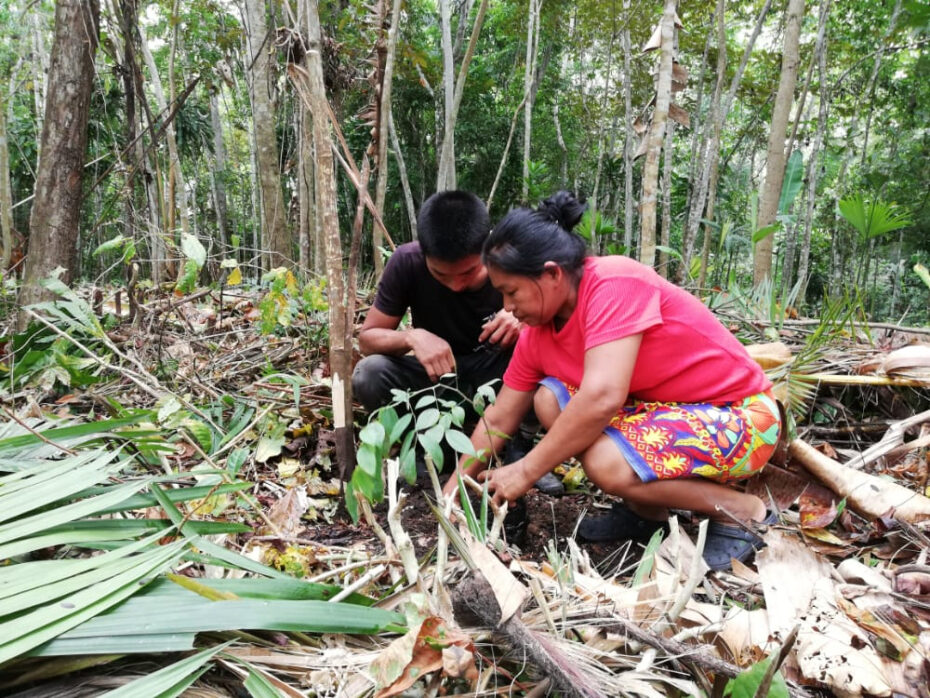
McGill has committed to a new fair-trade carbon offsetting project in partnership with Indigenous Panamanian communities, furthering the University’s efforts to achieve carbon neutrality by 2040 by planting trees to offset greenhouse gas emissions.
Through the partnership, the University has committed to providing the financial contribution necessary for the project’s implementation until, at least, the end of 2022. In 2020, the project successfully planted 25,000 native tree seedlings in collaboration with 25 families in Panama.
When regular business travel resumes post-COVID, McGill community members who travel by air on behalf of the University, such as researchers travelling for work or to attend conferences, will also be invited to contribute additional funds to the project to compensate for the greenhouse gases emitted during their travels. In doing so, community members will be offsetting their emissions and contributing towards McGill’s 2040 carbon neutrality target.
“This is a unique opportunity for the wider McGill community to relate their emitting activities, such as flying, to tangible mitigation efforts,” explained Catherine Potvin, a professor in the Department of Biology and Canada Research Chair in Climate Change Mitigation and Tropical Forest.
The project is led by the McGill Office of Sustainability and the Asociacion de Mujeres Artesanas de Ipetí Emberá (AMARIE), “an organization founded by the women of the Indigenous Ipeti Embera community, residing in Eastern Panama,” with the collaboration of Potvin who has a history of working with AMARIE through her past research in Panama.
Project empowers women
In addition to contributing to McGill’s carbon neutrality target, the project hopes to improve livelihoods of its partner communities. Through the partnership with AMARIE, the project is implemented with complete transparency including full consultation with local populations, respect of land rights, and local management and ownership of the project and its benefits.
This reforestation project is “very meaningful as it empowers women of our community to restore the lands that have been affected by deforestation,” said Sara Omi, from the Indigenous community of Ipetí Emberá de Alto Bayano and president of Congreso general Emberá de Alto Bayano Panamá.
By planting trees, Omi continued, “We have shown our society the importance of restoring our forests and re-establishing access to our traditional medicine while taking action on climate change.”
“This project has created space for our youth to connect with the forest and learn more about the importance of protecting biodiversity,” added Omaira Casama, president of AMARIE. “Our youth plays a significant role in this project as they embody the present and future of our communities.”
Important step toward carbon neutrality
A governance committee has been established by all involved with the partnership, including the traditional Emberá authorities of Congreso General de Alto Bayano. The group’s tasks will include reviewing the reforested areas, ensuring a fair price is maintained, and reviewing updated scientific research relevant to the project.
“Though the amount offset in the first year of the project represents a small fraction of McGill’s typical annual carbon footprint, it is an important step in demonstrating the level of commitment that will increasingly be required, in order to get to net zero by 2040,” said Lucie Viciano, Climate Officer with the Office of Sustainability.
AMARIE will act as a liaison on the ground with landowners and other individuals involved in the reforestation activities. They will ensure the proper implementation and on-the-ground governance of the project, and maintain the reforested areas for 25 years.
Making a difference in the world
Potvin’s work in Panama includes the Panama Field Study Semester (PFSS), in which McGill students travel to Panama to explore ongoing environmental issues in the country in collaboration with Panamanian institutions. The goal of the PFSS is to challenge the western perspective of global problems, allowing them to build “a more pluralist vision of the world’s environment.”
Undergraduate students enrolled in Potvin’s PFSS will get hands-on experience by monitoring the progress of the reforestation efforts. As such, the project aligns with both McGill’s Strategic Academic Plan 2017-2022 and Strategic Research Plan, of which sustainability is one of seven Research Excellence Themes.
“I see real-life applications, impacting lives at the community level, as well as making a difference globally, from a climate viewpoint,” said Katia Forgues, a former PFSS student currently working towards her master’s degree. Her research on carbon stocks accumulation through reforestation helps inform the project.
You can learn more about the McGill-AMARIE Carbon Offset project, the related research opportunities, and the communities involved here.
